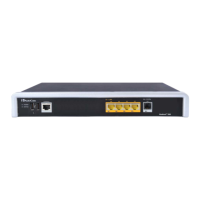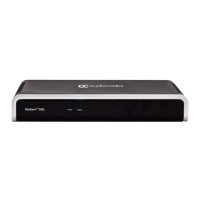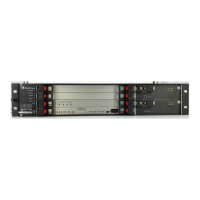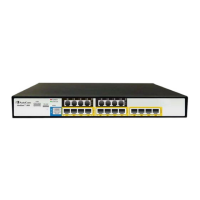SIP User's Manual 550 Document #: LTRT-83310
Mediant 600 & Mediant 1000
Parameter Description
effect (i.e., the parameter DisableNAT is set to 0).
For information on RTP Multiplexing, see RTP Multiplexing
(ThroughPacket) on page 157.
[EnableUDPPortTranslation]
Enables UDP port translation.
[0] = Disables UDP port translation (default).
[1] = Enables UDP port translation. The device compares the
source UDP port of the first incoming packet to the remote UDP
port stated in the opening of the channel. If the two UDP ports
don't match, the NAT mechanism is activated. Consequently, the
remote UDP port of the outgoing stream is replaced by the
source UDP port of the first incoming packet.
Notes:
For this parameter to take effect, a device reset is required.
The NAT mechanism and the IP address translation must be
enabled for this parameter to take effect (i.e., set the parameter
DisableNAT to 0 and the parameter EnableIpAddrTranslation to
1).
A.1.6 NFS Parameters
The Network File Systems (NFS) configuration parameters are described in the table
below.
Table A-6: NFS Parameters
Parameter Description
[NFSBasePort]
Defines the start of the range of numbers used for local UDP ports used
by the NFS client. The maximum number of local ports is maximum
channels plus maximum NFS servers.
The valid range is 0 to 65535. The default is 47000.
Web: NFS Table
EMS: NFS Settings
[NFSServers]
This parameter table defines up to 16 NFS file systems so that the
device can access a remote server's shared files and directories for
loading cmp, ini, and auxiliary files (using the Automatic Update
mechanism). As a file system, the NFS is independent of machine types,
OSs, and network architectures. Note that an NFS file server can share
multiple file systems. There must be a separate row for each remote file
system shared by the NFS file server that needs to be accessed by the
device.
The format of this ini file table parameter is as follows:
[NFSServers]
FORMAT NFSServers_Index = NFSServers_HostOrIP,
NFSServers_RootPath, NFSServers_NfsVersion,
NFSServers_AuthType, NFSServers_UID, NFSServers_GID,
NFSServers_VlanType;
[\NFSServers]
For example:
NFSServers 1 = 101.1.13, /audio1, 3, 1, 0, 1, 1;
Notes:
You can configure up to 16 NFS file systems (where the first index is
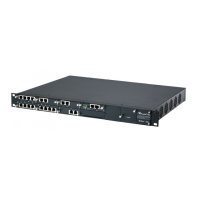
